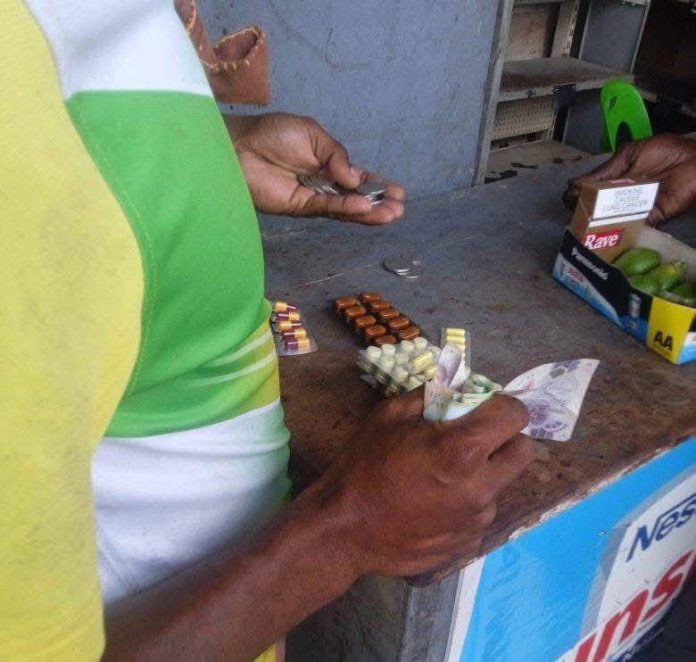By Sahr Ibrahim Komba
The rampant proliferation of drug peddling across Sierra Leone has escalated into a pressing public health crisis, underscoring the urgent need to reform the nation’s outdated pharmaceutical legislation. The Pharmacy and Drugs Act of 2001, once a cornerstone for regulating pharmaceutical practices, now falls short in addressing the complexities of modern drug abuse and illegal distribution.
On any given day, unlicensed drug vendors line the streets of Freetown and other major cities, openly selling medications without proper authorization. This unchecked distribution not only undermines the integrity of the healthcare system but also poses significant risks to public health.
A particularly alarming development is the surge in the use of “kush,” a potent synthetic drug composed of various harmful substances, including synthetic opioids and cannabinoids. Reports indicate that some variants even contain ground human bones, formaldehyde, and other toxic chemicals. The abuse of kush has been linked to severe health complications, including organ failure and a dramatic increase in psychiatric admissions. Between 2020 and 2023, the Sierra Leone Psychiatric Hospital reported a nearly 4,000% rise in admissions related to kush use.
President Julius Maada Bio declared the kush epidemic a national emergency, describing it as an “existential threat” to the nation. In response, a National Task Force on Drugs and Substance Abuse has been established to coordinate efforts in combating the crisis.
Despite the severity of the situation, the current legal framework provides minimal deterrents for illegal drug activities. Dr. Sheku S. Mansaray, Senior Regulatory Officer at the Pharmacy Board of Sierra Leone (PBSL), highlighted the inadequacy of existing penalties. “Whenever we conduct raids and arrest drug peddlers, they are levied minimal fines as stipulated in the 2001 Pharmacy and Drug Act. Because the offenders can afford to pay the fines, they return to the illegal trade,” he stated.
The PBSL’s Enforcement and Narcotic Control Department is tasked with combating the illegal sale of medicines, including narcotics like tramadol. However, limited resources and outdated legislation hamper its effectiveness.
To address these challenges, stakeholders advocate for a comprehensive overhaul of the Pharmacy and Drugs Act.
In order to address the issue of drug peddling, there is an urgent need to amend the Pharmacy Board Act and introduce stricter penalties for illegal drug sales and clearly define the roles of regulatory bodies to eliminate overlaps and inefficiencies.
Enhance the capacity of the PBSL through increased funding, training, and logistical support to effectively monitor and regulate pharmaceutical activities.
Establish legal mandates for pharmacovigilance to ensure continuous monitoring of drug safety and efficacy.
In dealing with this health crisis, the new laws should foster coordination among health regulatory bodies to streamline drug regulation and enforcement efforts.
In an exclusive interview, anonymous health practitioners have raised serious concerns about the public health system in Sierra Leone, describing it as “compromised” and highlighting the prevalence of expired drugs and food products in the market.
According to one health professional, most of the drugs entering the country are expired and often repackaged in colorful designs to mislead consumers. “Whenever we go to purchase medical supplies for our pharmacies, we have to be extremely careful to avoid expired drugs,” he said.
The source further explained that some of these medical supplies are marketed by skilled multimedia experts who design powerful packaging to boost visibility, while the Bureau of Standards and the Pharmacy Board appear to be doing little to address the issue.
“Most of the illnesses we see today are linked to expired drugs and contaminated food,” he noted. “Many canned foods are also expired, and the government should take urgent action to protect public health.”
Adding to the concern, Ibrahim Turay, a known drug peddler, disclosed that he and others in the trade source their drugs from a specific importer. “Our suppliers don’t deal with everyone—they have a select group of customers,” he said, though he declined to reveal their location.
Mustapha Bangura, another street drug peddler, admitted he has been arrested by staff of the Pharmacy Board several times but has always been released after paying a bribe of 200 to 300 Leones. “Once I pay them, they let me go back to selling,” he said. Mustapha has been peddling drugs on the streets of Freetown for over five years. “Only God knows the number of people my illegal activities have affected,” he confessed.
The revelations have sparked renewed calls for government action to crack down on expired drugs and food products and to address the apparent corruption within regulatory agencies.
Authorities should conduct educational campaigns to inform the public about the dangers of counterfeit drugs and the importance of purchasing medications from authorized sources or health professionals.
The escalating drug crisis in Sierra Leone, exemplified by the kush epidemic and rampant drug peddling, demands immediate legislative and regulatory action. Reforming the Pharmacy and Drugs Act is not merely a legal imperative but a crucial step toward safeguarding public health and restoring trust in the nation’s healthcare system.
As the country grapples with these challenges, the collective efforts of policymakers, healthcare professionals, and civil society will be instrumental in forging a resilient and responsive pharmaceutical regulatory framework.





